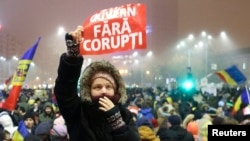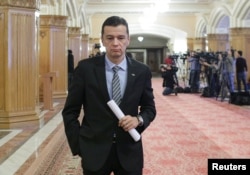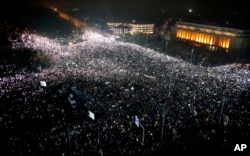Romania's president on Tuesday tore into the Social Democrat-led government over a corruption decree that has sparked the biggest protests since the 1989 fall of communism but backed it to stay in power, in a potential reprieve for Prime Minister Sorin Grindeanu.
The government on Sunday rescinded the decree, which critics said would have turned back the clock on the fight against corruption in the European Union member state.
Some protesters have pledged to keep up the pressure until Grindeanu resigns, although the number taking to the streets has fallen.
After 250,000 protested on Sunday night and 25,000 on Monday, turnout dropped to around 5,000 in Bucharest on Tuesday and several thousand in other cities. In the capital they chanted, "We'll be here day after day."
"The purpose of this protest is to have a clean government," said 36-year-old Tudor Muscalu, a designer who joined the demonstration in Bucharest. "The lack of trust at this point cannot be repaired."
In a speech to parliament, centrist President Klaus Iohannis admonished the government for issuing the decree a week ago "at night, in secret" without consulting parliament.
But he said the ruling Social Democrat Party (PSD) had won the right to govern in a December election and should continue to do so, a message that may take more of the sting out of the protests.
Hundreds of thousands of Romanians have demonstrated in the past week in cities across the country, thronging Bucharest's boulevards in scenes that will not have gone unnoticed elsewhere in Eastern Europe, blighted by corruption and cozy ties between business and politics since the end of communism.
"The prosperity of the Romanian people was not your first priority. Your first concern was to look after the penal files, and that's why Romanians are indignant and revolted," Iohannis told lawmakers.
Despite the crisis, he said new elections were not the answer.
"You have been saying in public that I would like to overthrow the legitimate government. That's false. You won, now you govern and legislate, but not at any price," Iohannis said.
"The resignation of a single minister is too little and early elections would at this stage be too much. This is the available room for maneuver."
Justice minister under fire
Though his role is largely ceremonial, the president's powers include nominating the prime minister after elections and returning legislation to parliament for reconsideration.
PSD lawmakers walked out of the assembly around halfway through the president's speech.
The Romanian leu firmed to a four-month high of 4.4800 per euro, before retreating to trade 0.3 percent up on the day at 4.4910.
Romania, a country of 20 million people and host to a U.S. ballistic missile defense station, remains one of the poorest and most corruption-ridden members of the EU.
The decree would have decriminalized a number of graft offenses and shielded many public officials from corruption allegations.
Protests are expected to continue at least until parliament votes on whether to endorse the government's repeal of the decree, likely by the end of the week.
One minister has already quit over the decree, saying he could not support it, and the Social Democrats have said they expect Grindeanu to decide whether or not to keep Justice Minister Florin Iordache, the architect of the measure.
The government, which holds a big majority, faces a no-confidence motion in parliament on Wednesday, when several PSD sources, speaking on condition of anonymity, have told Reuters they also expect Iordache to submit his resignation.
The Constitutional Court will also meet on Wednesday and Thursday to consider legal challenges to the now-withdrawn decree.
"For sure, some resignations would be needed and probably inevitable from the government," said political commentator Cristian Patrasconiu. "This is what the street would like to see."







